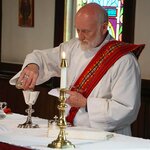You may know a deacon or two or three … but do you know much about the Order of the Diaconate? Don’t worry - it wouldn’t be too surprising if you didn’t!
Although deacons were first raised up in the earliest years of the Christian church, the renewal and revitalization of the order is a relatively recent phenomenon - one resulting from the hard work of visionary people in this diocese and across the country. There are now over 400 ordained deacons in Canada, and locally we have been home to more than 50 active deacons since the Diocese of New Westminster started to ordain deacons almost 30 years ago. Ever since then, our parishes and communities have benefited from the ministry of these non-stipendiary deacons who have served with prayerful hearts and rolled-up shirtsleeves.
Deacons were first established by request of the 12 apostles. In Acts 6, we read that seven men "well respected and … full of the Spirit and wisdom" were chosen to distribute food and do other tasks in the community to free up the apostles for prayer and teaching.
Deacons, however, were not just your friendly neighbourhood delivery men. For example, Stephen, one of the seven, was a bold and effective sidewalk preacher who was stoned to death by religious authorities alarmed by his radical and riveting message. The Greek word 'diakonia' is most often translated as 'servant,' giving rise to the image of deacons doing the hard and humble work of serving the sick, the hungry and the lonely. However, scholarly work has shown that the word is used just as often in the scriptures to mean an 'envoy' or an 'agent' - someone who served in various ways on behalf of the bishop.
This relationship between deacon and bishop is symbolized in our ordination service. You may have noticed that when priests are ordained, all other priests in attendance gather around and lay a hand on them in prayer - symbolizing the unbroken chain of succession from the apostles. If you’ve ever wondered why a deacon does not get a similar "hands-on" treatment from supportive colleagues, this early church text from roughly 215 CE will help:
When the deacon is ordained, this is the reason why the bishop alone shall lay his hands upon him: he is not ordained to the priesthood but to serve the bishop and to carry out the bishop's commands.(1)
By the Middle Ages, however, the role of the deacon unfortunately became starved of vocational oxygen. Instead of being Christ’s hands and heart out in the world, helping to carry out the mission of the church, deacons gradually focussed more on their liturgical worship role, serving at the priest’s right hand while he consecrated the elements during the Eucharist. This gave rise to a hierarchical re-visioning of the deacon as being an assistant to the priest, a perception that persisted in the centuries that followed. The work of the deacon as the bishop’s envoy, or ambassador of the Church writ large, shrunk accordingly.
The Anglican Church of Canada has worked hard and well to re-oxygenate the diaconate and re-establish it as a full and equal order with a calling uniquely its own. While the Diocese seeks to ordain deacons and priests who demonstrate the same foundational qualities of character, deacons need to feel particularly propelled into the culture of the world around them, where they can channel their love for God into love for neighbour. What form this may take is as unique as the deacon themself; finding the place where "one’s deepest joy meets the needs of the world" is essential in keeping deacons, and the diaconate, flourishing.
The deacons of this diocese don’t just feed the hungry - they also coach business leaders, minister in hospitals and care homes, assist non-profits with bank financing, work on community farm and co-housing projects, help refugees and seniors find health care and housing, teach the Bible, lead in crisis intervention, work in regulatory environments, and far more. Whatever their career or circumstance, they are called to infuse their surroundings with Christ’s justice, hope and peace.
The recently retired Archdeacon Richard Leggett, an early promoter and great supporter of the diaconate, sometimes referred to the "deacon-shaped hole" that exists in parishes that are without a deacon on the leadership team. When Bishop John makes his episcopal visits, we do all we can to make sure a deacon takes part so that parishioners can witness a deacon fulfilling their liturgical role - and have the opportunity to ask questions about a deacon’s wider ministry in the world.
If you are feeling the Spirit tugging you to explore the diaconate, please visit the clergy section of the Diocesan website, speak with your parish priest, and/or contact me, the Ven. Peggy Trendell-Jensen (deacon at St. Clement’s, Lynn Valley) for a chat (email: ptrendell-jensen@vancouver.anglican.ca). There’s no life like it!
(1. Apostolic Tradition of St. Hippolytus of Rome)












